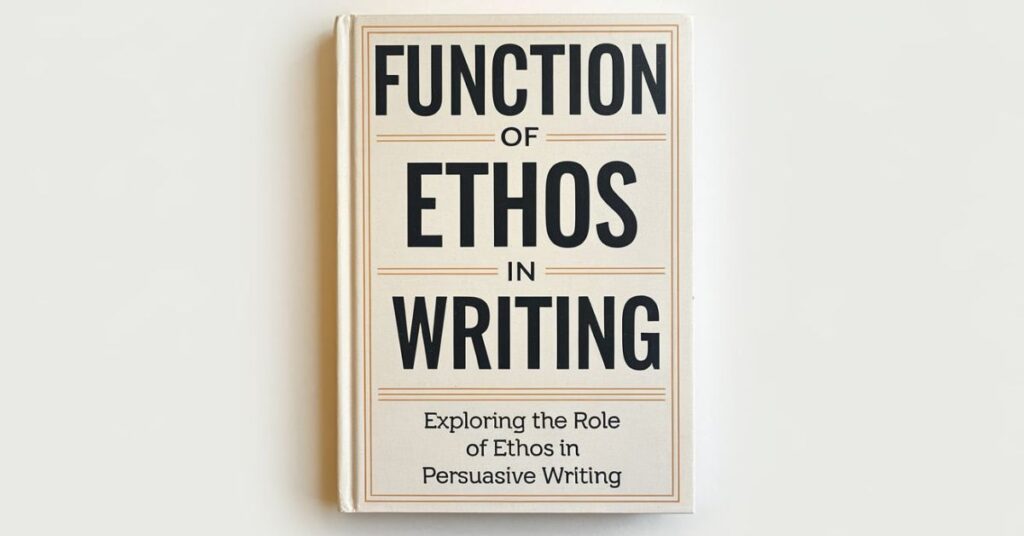In literature, ethos plays a central role in developing characters that feel authentic and trustworthy. ethos examples in literature are a rhetorical device used by writers to establish a character’s credibility and moral standing, allowing readers to connect with them on a deeper level.
Ethos doesn’t just influence how we view characters; it shapes their decisions, actions, and interactions with others, often driving the plot forward. By exploring ethos examples in literature, we can better understand its impact and how authors use it to craft compelling narratives.
In this article, we will explore the definition of ethos, why it matters, and look at several prominent examples in literature.
What is Ethos?
At its core, ethos is a rhetorical device that appeals to a character’s credibility and moral authority. Derived from the Greek philosopher Aristotle’s concept of persuasion, ethos focuses on convincing an audience of the character’s trustworthiness. In literature, ethos doesn’t just reflect a character’s reputation; it also reveals their values, principles, and integrity.
When a character has strong ethos, readers tend to trust them more. Ethos examples in literature, They believe in the character’s motivations and decisions. On the other hand, when a character has weak ethos, readers may question their intentions and feel disconnected from the story. A well-crafted ethos makes a character believable, influencing how readers engage with the plot and their emotional journey.
function of ethos in writing
Ethos plays a crucial role in writing by establishing the credibility of both the author and their characters. It helps build trust with the reader, making them more likely to engage with the message. Believe in the authenticity of the argument or narrative. Without a strong sense of ethos, writing can lack authority, and the audienc. Ethos examples in literature, may question the validity of what they are reading. Whether the author is presenting a persuasive essay, a story, or an argument. Ethos guides the overall tone and helps to create a meaningful connection with the audience.

Establishing Credibility
One of the primary functions of ethos in writing is to establish credibility. In persuasive writing, an author must prove that they are knowledgeable. Trustworthy, and experienced in the subject matter they are discussing. For example, a writer discussing climate change . Will earn the reader’s trust more easily if they cite credible scientific studies and convey a clear understanding of the topic. Similarly, a character in a story builds ethos through their actions, words, and background. Allowing readers to see them as reliable and honest. This credibility encourages readers to believe the character’s decisions, opinions, and actions, which strengthens the narrative.
- Example: A doctor writing a medical article on a new treatment option will be more credible.If they highlight their years of medical experience, their qualifications, and relevant research. This establishes their ethos and makes their argument more persuasive.
Ethos Examples in Literature
Ms. Williams in The Education Solution by Sara Thomas
In The Education Solution, Ms. Williams stands as a dedicated teacher who builds her ethos on years of experience and a genuine commitment to improving the education system. People know her for her wisdom, fairness, and ability to make difficult decisions with integrity. As a leader in educational reform, her credibility is vital to gaining the support of colleagues, parents, and the community.
In the story, Ms. Williams pushes for a new reform plan that aims to bridge gaps in education for underprivileged students. Her strong ethos is based on the respect she has earned in her field. Her deep understanding of the educational system, and her genuine desire to make a positive change. She uses logical reasoning, backed by years of experience and research, to persuade others to join her cause.
- Key Ethos Points:
- Years of experience and expertise in the field of education
- Demonstrates fairness, integrity, and a commitment to improving the system
- Builds credibility with others through rational arguments and authentic actions
Prime Minister Reed in The Road to Peace by David Johnson
Prime Minister Reed in The Road to Peace is a character driven by his unwavering ethical beliefs. His ethos is based on his reputation for fairness and moral clarity. Throughout the novel, Reed must navigate political challenges and personal dilemmas. His ability to stay true to his values, even under pressure, highlights his credibility and leadership integrity.
Reed’s ethos is most evident during his public speeches, where he speaks passionately about peace and democracy. His appeal is not just logical but deeply moral. By relying on his authenticity and wisdom, Reed persuades others to support his vision of a peaceful future.
- Key Ethos Points:
- Reputation for moral clarity and fairness
- Leads with an unwavering commitment to peace and democracy
- Uses his authority and ethical principles to guide his decisions
Dr. Roberts in The Cure by John Smith
Dr. Roberts in The Cure exemplifies ethos through his medical knowledge and commitment to his patients’ well-being. His character is based on years of experience in the medical field and a reputation for honesty. As a trusted doctor, his patients and colleagues rely on his decisions, even when they are faced with tough ethical choices.
In one critical scene, Dr. Roberts must decide whether to recommend a risky treatment to a terminally ill patient. His decision is informed by both scientific analysis and his deep sense of moral duty to his patients. The way Dr. Roberts approaches this situation shows how ethos can shape a character’s actions and decisions.
- Key Ethos Points:
- Years of experience and expertise in medicine
- Strong ethical principles guiding patient care
- Compassion and moral responsibility toward patients’ lives
Character A in The Importance of Dialogue by Jane Doe
Character A in The Importance of Dialogue demonstrates ethos through their ability to mediate conflicts with wisdom and integrity. Known for their calm demeanor and ability to empathize, they are respected by all parties involved. Their reputation for fairness and logical reasoning allows them to bring opposing sides to the table and help find common ground.
Throughout the story, Character A’s ethos is tested as they navigate increasingly complex disputes. They rely on rhetorical devices like empathy, careful listening, and tactful speech to maintain their credibility and find solutions. Their ethical appeal lies in their belief that dialogue and understanding are the key to resolving conflict.
- Key Ethos Points:
- Reputation for fairness and wisdom in resolving conflicts
- Empathy and active listening foster trust and understanding
- Uses logical arguments to mediate disputes effectively
Dr. Hanson in Call to Action by Jane Kramer
Dr. Hanson in Call to Action is a public health expert who roots his ethos in his scientific expertise and dedication to improving public health. He uses his authority to guide the public through a health crisis. Making difficult decisions that require careful analysis and ethical consideration. Dr. Hanson is respected because of his commitment to scientific data and his moral responsibility to protect the public.
As the story unfolds, Dr. Hanson faces political opposition to his health policies. Despite this, his ethos remains intact because of his deep-rooted commitment to the well-being of the public. His credibility in the field of medicine and his unwavering dedication to ethical standards make him a trustworthy figure.
- Key Ethos Points:
- Authority as a respected public health expert
- Relies on scientific analysis and moral principles to guide decisions
- Demonstrates trustworthiness and integrity despite political pressure
Mr. Thompson in The Honorable Business by Timothy Clark
Mr. Thompson in The Honorable Business stands out as a businessman known for his ethical practices and leadership integrity. In a world where business often focuses on profit, Thompson’s ethos sets him apart. He guides his actions with a belief in fairness, transparency, and respect for all employees.His reputation for honesty makes him a role model for others in the business world.
Throughout the novel, Thompson faces temptations to engage in unethical practices to boost profits, but his ethos prevents him from compromising his values. His ability to lead with integrity strengthens his reputation and proves that ethical business practices can lead to long-term success.
- Key Ethos Points:
- Known for his commitment to fairness and ethical practices in business
- Builds a reputation based on honesty and goodwill
- Stands firm against unethical business practices to maintain credibility
Related Terms with Ethos
Pathos
Pathos refers to the appeal to the audience’s emotions. In rhetoric, it’s a strategy used to evoke feelings that motivate the audience to accept the speaker’s or writer’s point of view. By engaging pathos, a speaker or writer can create an emotional connection that moves the audience to act, change their opinion, or feel a certain way.
In Charles Dickens’ “A Tale of Two Cities,” the opening line, “It was the best of times, it was the worst of times,” immediately sets the emotional tone of the novel, creating a deep contrast that reflects the turmoil and struggles of the French Revolution. By appealing to the reader’s emotions right from the start, Dickens establishes an emotional engagement with the audience.
Logos
Logos refers to the appeal to logic and reason. This rhetorical strategy uses facts, data, and logical reasoning to persuade an audience. The goal of logos is to convince the audience of an argument’s validity by presenting clear, rational, and evidence-based reasoning.
In Plato’s “Republic,” Socrates uses logical arguments to persuade his fellow philosophers about the nature of justice. Through systematic reasoning and the use of hypothetical situations, Socrates constructs a logical argument that forces the reader to reconsider their beliefs.
Conclusion
Ethos is a powerful tool in literature, enabling authors to create characters who are credible, trustworthy, and morally sound. It shapes how characters are perceived, their relationships with others, and how they drive the plot. By examining ethos examples in literature, we gain insight into how authors use this device to enhance their storytelling. From leaders like Prime Minister Reed to everyday heroes like Dr. Roberts, ethos adds authenticity, depth, and moral clarity to characters.
Understanding ethos allows readers to appreciate the complexities of character development and recognize the deeper meanings behind their actions. Next time you read a book, pay attention to how ethos influences the narrative, and how characters’ moral. Principles guide their decisions and shape the outcome of the story. Whether a character upholds their integrity or faces a crisis of conscience, ethos is a critical element that brings stories to life.
FAQS
1. What is ethos in literature?
Ethos refers to the character, credibility, and trustworthiness of the speaker or writer in a piece of writing. It helps establish authority and gain the audience’s trust by showcasing the speaker’s expertise, morals, and values. Writers use ethos to build a strong reputation and persuade readers that they are reliable and knowledgeable on the topic.
2. How does pathos influence an audience?
Pathos appeals to the audience’s emotions. By using vivid language, personal stories, or emotional appeals, writers and speakers can create a deeper emotional connection with the audience. This emotional engagement encourages empathy, motivates action, or prompts a change in perspective.
3. What is the role of logos in writing?
Logos refers to the use of logical reasoning, facts, data, and evidence to support an argument. It helps persuade the audience through clear, rational arguments. By presenting well-structured reasoning and objective evidence, writers and speakers can appeal to the audience’s sense of logic, providing a strong foundation for their claims.
4. Can ethos, pathos, and logos be used together?
Yes, ethos, pathos, and logos often work together to create a well-rounded persuasive argument. Ethos establishes trust and credibility, pathos evokes emotional responses, and logos provides logical reasoning. Combining all three appeals can make the argument more powerful and convincing.
5. How can I improve my use of ethos in writing?
To improve your use of ethos, focus on establishing your credibility through your experience, qualifications, or knowledge of the subject. Be sure to demonstrate integrity and fairness in your tone and writing style. Additionally, using reliable sources and evidence can help reinforce your authority and make your argument more persuasive.

Jenni Maic is a creative wordsmith at Grammar Globe, where she brings humor and wit to the world of puns and English grammar. With a passion for playful language and a knack for simplifying grammar, Jenni’s articles make learning engaging and entertaining. Discover her work at https://grammarglobe.com/.







